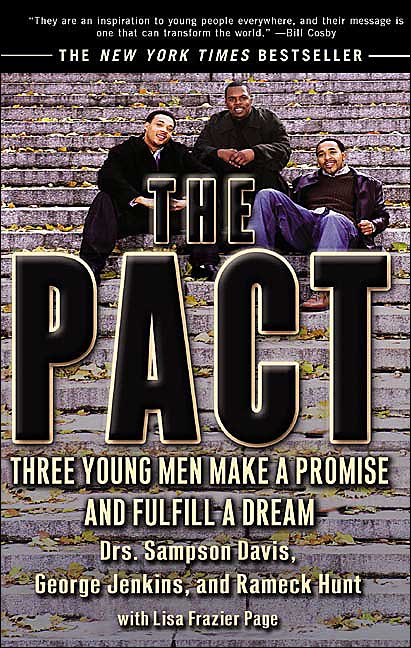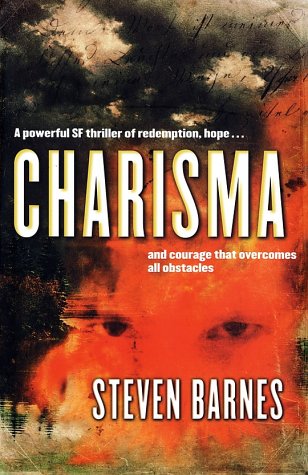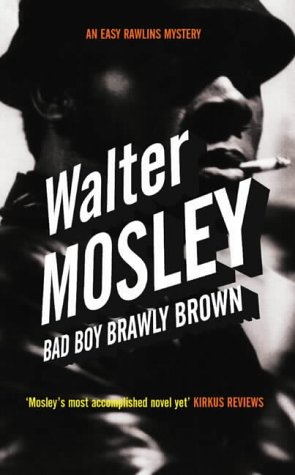Review of "The Pact" that BET refused to run...Still waiting for my $50 Kill Fee

Review by Philip Shropshire
"The Pact" offers an intriguing premise: three African American men, raised in tough New Jersey neighborhoods, agree to support each other in their quests to become doctors. Right off the bat, it’s not quite successful as nonfiction suspense because we know that Sampson Davis and Rameck Hunt become doctors and George Jenkins fulfills his lifelong ambition to become a dentist. Now, suspense squandered, try to imagine what that book would be about. I promise you that "The Pact" is exactly, down to the drug-addicted parents, gang problems and varied police harassments, what you might imagine it to be. Usually, I don’t find that to be a mark of excellence in books that I read. Yet I say to each his own. There’s no absolute good or bad per se, but what you like and dislike. That’s my theory anyway. Say, for example, that you are genuinely moved by ABC Afterschool specials, then perhaps you will like this book. Say, for instance, that you are driven to tears by an effectively written Hallmark card, then perhaps you will like this book. Say, to beat this point into the ground, that you don’t get the jokes in George Wolfe’s play "The Colored Museum", then maybe you will appreciate the merits of this book. It’s all relative. Don’t get me wrong. It’s not necessarily a bad book. It’s competently written and I admire the black men who are portrayed in it. I also think that this book, along with another book that I reviewed called "The Miner’s Canary", strongly suggests that black kids should use group study methods. I also enjoyed the celebrity stunt casting as well, one of the few surprises that the book actually offered up. You get cameos from Dr. Juwanza Kunjufu, poet Amira Baraka, singer Faith Evans and there’s even a spotting of the late Biggie Smalls--who, shockingly enough, turns out to be a guy who can polish off a lot of fried chicken in record time. I suppose I just have overall Big Picture problems with this book. For example, It would not be unlike a dramatic tale of how black men rose up in the South African police force during the apartheid era. I might find their tenacity admirable but I would find the book remarkably empty without a prescription as to how to end apartheid. Likewise, when I read "The Pact", I can’t help but notice that there’s a health care crisis within the United States, driven not only by ruthless and greedy HMOs, but the artificial shortage of doctors (and probably nurses) mandated by the doctor’s union, the American Medical Association. And while these black doctors have made a commitment to give back to the community--and this is honorable--the black community in total might be better served by a single payer system of health care and less wealthy doctors. In other words, "The Pact" treats some symptoms, but offers no cure for the various diseases of: under funded inner-city schools, prohibitively expensive college educations, the national turn away from affirmative action, and a technology gap between rich and poor that will only grow. And frankly, I don’t see how "group study" or even the laudatory success of these three guys changes these disturbing macro trends one bit. So, to sum up, I recommend this for struggling black students and people who really really like Tales of Inspiration and expressive Hallmark cards. For everybody else I would recommend the classic "Autobiography of Malcolm X", Richard Wright’s "Black Boy" and even Nathan McCall’s "Makes Me Wanna Holler" before you wade into "The Pact".
![]() A long time ago, I
used to write book reviews for BET. It kind of ended
when I wrote this book review--it didn't have the
ending my editor had in mind. ("Everybody should be a doctor!")
(Will link to it later.) And for some reason, my other book reviews have
gone down the memory hole. So I'm reprinting them here. I recommend both of
these books by the way.
A long time ago, I
used to write book reviews for BET. It kind of ended
when I wrote this book review--it didn't have the
ending my editor had in mind. ("Everybody should be a doctor!")
(Will link to it later.) And for some reason, my other book reviews have
gone down the memory hole. So I'm reprinting them here. I recommend both of
these books by the way.

Charisma
By Steven Barnes
TOR Books
2002
As a matter of record, let it be stated that this reviewer enjoyed the Harry Potter books and the Lord of the Rings movies very much. This is despite the belief that their writers live or have lived in what could only be called very White White White White White worlds. Tolkien could be forgiven. Afterall, those were the times. Not only that: any attempt by him to handle the race matter would turn out like Kipling’s patronizing romantic view of colonialism anyway. But J.K. Rowling? Hasn’t modern Britain turned into an island full of Indian and Jamaican immigrants? Don’t tell me Rowling never saw them, like Woody Allen’s missing black and Hispanic New Yorkers for all those years, with her modern eye. Her perceptions must have been dimmed by a devilish incantation.
Surely, someone can write a good fantasy novel and have people of color play a significant role. Turns out that the ever prolific Steven Barnes has already written that good book and as you might imagine: It’s a bit darker than anything that Rowling has ever come up with, not just in tone, but casting. Or at least I don’t remember private assassins—partial to using hit and run techniques on bicycling kids—murderous drug dealing bikers and gay body builders with a mean streak ever taking a ride on Harry Potter’s magic train. Here’s a hint of Charisma’s NC-17 tone: an angry gang of male gay body builders aren’t just content to kick your butt silly. I’ll leave it at that.
Charisma’s premise is actually pretty interesting. What would happen if you took the genetic structure of what we could call African American super people (Your Alis, Robert Johnsons, Oprahs and so forth) and genetically transferred their traits into young children from poor backgrounds. And what if it turns out that the book’s fictional black super achiever, Alexander Marcus, a black billionaire Rupert Murdoch with a military background, has a ruthless streak that the scientists didn’t know about? You would get some very ruthless and intelligent mutant kids (The X-Men are even mentioned.) who seem to live an ethic that Machiavelli or Sun Tzu would admire. You could argue that their murders are all self-defense, but it’s still grisly. The kids are such effective machines that at the book’s denouement—where the assassins, armed with their big guns and their Nam tactics, slowly unfold their plans to make the genetically altered kids summer Camp Charisma experience a fatal one—you might find yourself feeling a kind of precognitive pity for the assassins. Turned out to be right. It’s not unlike reading the “The Wrath of Khan: The Pre-Teen Years”, for those of you who get Star Trek references.
The big thrill here is that you get your science fiction with a varied cast of color. Black folks are represented at almost every level of society doing interesting cool things. There’s the hack reporter looking for one last great headline, the struggling business owner mother of one, the ex-jock, the street kids, even the super achiever. Barnes even manages to touch upon class differences within the black community itself. These are insights missing from the movies these days, a lot of science fiction television, and even genre books for that matter.
All in all, a very satisfying read. Don’t be surprised to find yourself racing through the final 100 pages even though you can see what’s coming. It would be nice to see this on screen, just as affirmation that black people can be included in Great Fantasy and it can still be a cool story as well.

Bad Boy Brawly Brown
By Walter Mosley
As someone who’s not entirely thrilled with Walter Mosley’s science fiction—and by that I mean that I really didn’t like “Blue Light”—I’m happy to report that the writer has taken us back to the world of his now legendary and iconic private eye Easy Rawlins in Bad Boy Brawly Brown. With his Rawlins titles always marked with the name of a color, Walter Mosley offers more than just readably exciting genre books: they reach the level of passionate social history and Great Art. Bad Boy is no exception. I couldn’t put it down.
This new book takes us to the Los Angeles of 1964. It features, in no particular order: the rise of a group that sounds suspiciously like both the Nation of Islam and the Black Panthers, some surprising commentary on the value of a high school education in a white society, and some out and out premonitions about the fate of black leaders and the COINTELPRO (The CIA’s counterintelligence operations and do a google search if you’re curious.) operations.
By the way, we know this is fiction written by a black man because Easy essentially closes down the LA headquarters of COINTELPRO after a vigorous letter writing campaign to the NAACP and local media. Good job Easy. If only you were real…
There is also the usual assortment of shady characters, police beatings, fistfights, gunshots, big scores, dead bodies and dark sexual secrets. There’s also the question of whether Easy’s equally legendary sidekick Mouse actually died in the last book “A Little Yellow Dog”. All of the aforementioned factors are tied into a complicated Raymond Chandler plot that I wasn’t even close to figuring out until the very end. But, to be honest, I enjoyed the journey so much the destination became moot.
After all, Mosley’s Easy Rawlins books aren’t just detective novels. They are, in fact, social snapshots of a time, of a place and of a people. If you want to see a perspective of how working class black folk were living in 1964—and you’re too lazy to dig through the works of Manning Marable or John Hope Franklin—just read the Rawlins books and you’ll get a pretty good perspective of How It Was. The busy work of his genre motifs of fisticuffs, corrupt cops and black female molls is always seen through a historical prism. The Vietnam War and the civil rights movement serve as the backdrops this time. (Where will Easy be during the Watts riots and the day Bobby Kennedy got shot…?) Yet it’s Mosley’s commentary about these ideas and movements, as seen through Easy’s jaded 44-year-old eyes, that’s just so interesting. For example, one character talks about how the cops plan to kill or discredit all the important black leaders. Easy makes the call that his adopted son Jesus would be better off being home taught than facing hostile instructors at the public school.
There are also the usual Easyisms. Easy has a nice habit of falling into off the books Big Scores and then there’s this food thing. We learn that the collard greens have the scent of vinegar and bits of salt pork. The lasagna has a thick red sauce. Mosley really gives you the feel of a place with his eye for tastes, smells and textures. There’s also some great intelligence in the storytelling throughout. I thought it was a stroke of genius when we find that the smoker Rawlins huffs and heaves after just running two blocks.
Final verdict: Bad Boy Brawly Brown is great storytelling combined with a social conscience. It’s a great read and just more proof that Walter Mosley just might be the best black male fiction writer alive today.